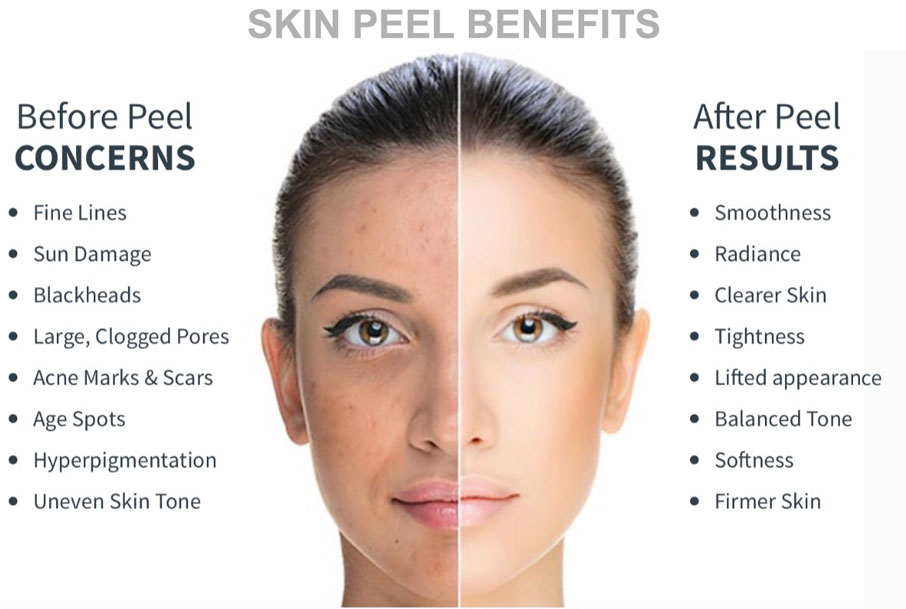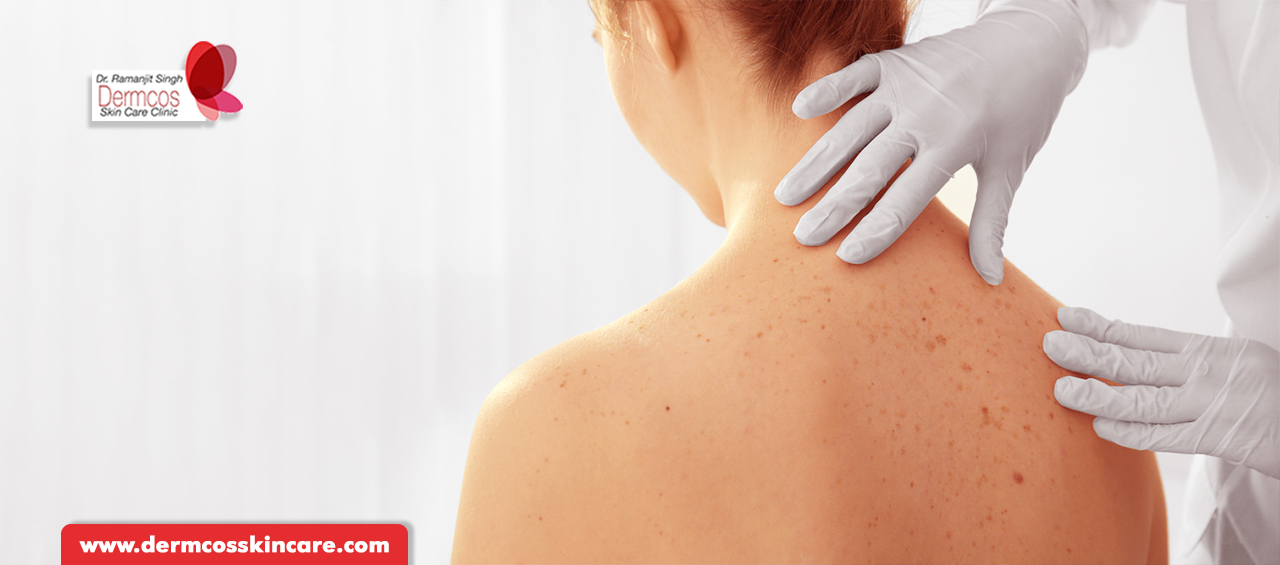Glowing and radiant skin is everyone’s dream. Prevalent skin problems have led to the evolution of treatments. Whether it is men or women, everyone is having some type of skin problem. Several types of chemical peel have come up in the market to cater to the rising skin problems. Chemical peels are ideal for eradicating damaged skin cells and bring forth the amazing skin that is hidden underneath. Dermatologists have always given a green signal to the benefits of chemical peel. Depending on the types of chemical peel, the benefits differ. If you are experiencing several skin problems, this blog will guide you to understand the types of chemical peel and their concerned benefits.
Is Chemical Peeling Good for The Skin?
Chemical Peel is one of the leading skin care treatments, adopted by many skincare enthusiasts. This treatment involves the exfoliation of the skin using a chemical solution. Once the chemical solution is applied to your skin, a blister is formed that eventually peels off. Although chemical peel types are tremendously popular in the market, laymen still question their effect on the skin.
The reason why chemical peels have garnered huge popularity is that it vouches to improve the appearance of the skin. Today Indian skin tone experiences several problems like dullness, damage, sunburn, pigmentation, blemishes, acne scars, etc. With chemical peel benefits, your skin can get rid of dead cells and other related concerns. They peel off the old damaged skin layer and expose a new, radiant skin surface. However, depending on your concern, a Dermatologist may offer you chemical peel types that suit you the best.
How Often Do You Need a Chemical Peel?
Generally, chemical peel benefits can last from one to two months. However, the effect depends upon the chemistry of the solution. If the chemical peel contains a strong solution, the effect can last for months. However, a light and gentle chemical peel benefit on the face can last around a month.
Many skin care specialists recommend getting a chemical peel every four to six weeks. However, people with acne-prone and highly damaged skin can use the best-suited chemical peel every fifteen days. Most people also prefer to purchase chemical peels in bulk and store it for months. People suffering from vital skincare problems should visit Dermcos Skin Care clinic, to get the ideal chemical peel treatment.
Is a Chemical Peel Good for Your Skin?
Absolutely! A chemical peel is a safe and effective treatment that can work wonders for your skin. It’s a popular choice among dermatologists and skincare enthusiasts for various reasons. Here’s why a chemical peel is a fantastic choice for your skin:–
- Improved Skin Texture
A chemical peel helps in exfoliating the top layer of your skin, which is often riddled with dead skin cells, imperfections, and a lackluster appearance. This process encourages the growth of fresh, healthy skin. The result is smoother, softer, and more evenly textured skin. If you’ve been dealing with issues like roughness, fine lines, or mild scarring, you’ll be delighted with the improved texture.
- Radiant Complexion
If you’re looking to say goodbye to skin concerns like sunspots, age spots, or melasma, a chemical peel is your ally. It targets excessive melanin production in the skin and assists in restoring a brighter, more uniform complexion. The outcome? A radiant glow that can significantly boost your self-confidence.
- Effective Acne Control
Acne breakouts can be a source of frustration, and chemical peels can be your secret weapon in managing them. These treatments unclog pores, reduce inflammation, and help regulate oil production in your skin. The end result is fewer acne breakouts and a clearer, healthier complexion.
Can You See Results After 1 Peel?
Yes, you can certainly see results after just one chemical peel! The extent of these results may vary depending on factors such as the type and strength of the peel, your individual skin type, and the specific skin concerns you’re addressing. Typically, after one peel, you can expect mild to moderate improvements in your skin’s texture, tone, and appearance. This might include reduced fine lines, a brighter complexion, and a more even skin tone.
However, it’s essential to understand that the full potential of chemical peels is often realized through a series of treatments. Many individuals choose to undergo multiple peels, usually spaced a few weeks apart, to achieve their desired level of improvement. These cumulative treatments can lead to significant and long-lasting results. Your skincare professional can help you create a personalized treatment plan to meet your specific goals.
What Are 3 Benefits of a Chemical Peel?
Chemical peels are celebrated for their multifaceted benefits. Here are three standout advantages of this skincare treatment:–
- Exfoliation and Renewal:- Chemical peels provide a deep exfoliation that removes dead skin cells and encourages the development of new, healthier skin. This process revitalizes your skin, leaving it looking fresh, rejuvenated, and more youthful.
- Targeted Solutions:- One of the remarkable features of chemical peels is their versatility. They can be customized to address specific skin concerns, from fine lines and wrinkles to acne, hyperpigmentation, and sun damage. This means you can tailor your treatment to meet your unique needs.
- Minimal Downtime:- Unlike some other skin treatments, chemical peels offer impressive results with minimal downtime. You can usually resume your daily activities shortly after the procedure. This convenience makes them a practical choice for individuals with busy lives.
Different Types of Chemical Peel
For getting a skin-suitable chemical peel, the skincare specialist may examine your skin type and offer the best suited chemical peel for you. The types of chemical peel cater to various skin concerns. Skincare should never be taken lightly, which is why a dermatologist like Dr. Ramanjit Singh can give you the best chemical peel advice. Following are the most renowned variants of chemical peel:
- Glycolic Chemical Peel: This type of chemical peel offers a deep exfoliation. It clears out the clogged pores and sloughs off the dead skin cells. Glycolic Acid brings forth a smooth and glowing layer of skin.
- Retinol Chemical Peel: Fused with Vitamin A, Retinol Chemical Peel penetrates deep into your skin. It reaches the subdued skin cells and revives them to grow back for a refreshing complexion.
- Lactic Chemical Peel: Lactic chemical peel involves milk and lactic acid. This chemical peel is ideal for sensitive skin as it is gentle on irritated skin and moisturizes it.
- TCA Chemical Peel: Containing Trichloroacetic Acid, TCA chemical peels renew the skin from superficial to deep level. It is an excellent form of spot treatment and is used in the concerned area.
- Beta Chemical Peel: If you have acne pore skin with incessant sebum production, Beta Chemical Peel should be your best choice. The salicylic Acid in this chemical peel controls the oil production and takes care of the bacteria.
- Mandelic Chemical Peel: This chemical peel is a go-to anti-ageing solution in the world of chemical peels. It boosts the collagen of the skin and retains youthful firmness in your skin.
Benefits of Chemical Peel
Who doesn’t want to look young and beautiful? With the types of chemical peel comes the various benefits of a chemical peel on the face. Today several people are adopting this treatment to experience the fruitful chemical peel for face benefits. Here are listed the leading benefits of chemical peel
- Exfoliates your skin for a better texture
- Triggers the collagen production in the skin
- Reduce the signs of ageing
- Minimize the hyperpigmentation
- Smooth and soft skin
- Brings back the lost glow
- Offers a dewy look
- Eradicates acne scars
- Control sebum production in oily skin
- Soothe irritation in sensitive skin
- Boosts up your skincare regimen
Takeaway
Dermcos Skin Care Clinic headed by Dr. Ramanjit Singh is a one-stop destination for all your skin problems. They will customize the chemical peel types to offer the best benefits of a chemical peel on your face. Call now to book an appointment.
FAQs
Can Chemical Peels Really Reduce Signs of Aging?
Yes, chemical peels can effectively reduce signs of aging, including wrinkles, fine lines, and age spots. They work by exfoliating the top layer of skin, which stimulates collagen production and encourages the growth of new, healthier skin cells. However, the degree of improvement may vary depending on the individual and the type of peel used. Deeper peels tend to produce more noticeable results.
Are At-Home Chemical Peel Kits Safe to Use?
At-home chemical peel kits can be safe if used correctly, but they come with risks. Professional dermatologists have the expertise to assess your skin and choose the right peel for you. DIY kits may not be as tailored to your specific needs. It's safer to have chemical peels done by a trained professional who can minimize the risk of adverse reactions and complications.
What's the Ideal Frequency for Getting Chemical Peels?
The ideal frequency for chemical peels depends on your skin's condition and the type of peel used. Light chemical peels may be done every four to six weeks, while stronger peels may only be necessary every few months. For individuals with persistent skin issues like acne, a dermatologist may recommend more frequent treatments, possibly every two weeks. Consult with a skincare specialist to determine the best frequency for your skin.
Which Chemical Peel Type is Best for Acne-Prone Skin?
Beta chemical peels, containing salicylic acid, are often recommended for individuals with acne-prone skin. Salicylic acid is known for its ability to control oil production, clear pores, and combat acne-causing bacteria. It's essential to consult a dermatologist who can assess your skin and recommend the most suitable peel type for your specific acne concerns.
Are There Any Side Effects or Risks Associated with Chemical Peels?
While chemical peels are generally safe, they can have side effects, including redness, peeling, and mild discomfort. More profound peels can cause swelling and require more extended recovery periods. Rarely, complications like scarring or changes in skin color can occur. It's crucial to follow post-treatment care instructions and consult with your dermatologist if you experience any unusual side effects.
How Can I Choose the Right Dermatologist for Chemical Peel Treatments?
When selecting a dermatologist for chemical peel treatments, consider their experience, qualifications, and reputation. Look for reviews from previous patients and ask for recommendations. During a consultation, discuss your specific skin concerns and treatment goals. The right dermatologist will offer a personalized treatment plan and address any questions or concerns you may have.



